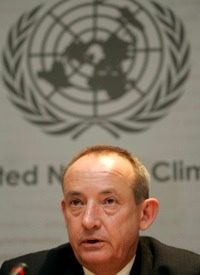
United Nations global warming officials said this week that a final climate change treaty will be “impossible” to reach at the December summit in Copenhagen due to disagreements on financing and emissions targets, but they are not giving up.
According to news reports, UN climate chief Yvo de Boer told a conference call that as long as a framework was established, the details could be filled in next year. Whether the U.S. Senate will be expected to ratify any treaties before “the details” are worked out remains unclear.
"Copenhagen can and must agree on the political essentials that make a long-term response to climate change clear and realistic," de Boer said. He told reporters that “time is running out” and that rich countries should “immediately” hand over a minimum of $10 billion to help poorer nations “adapt to climate change.” He also prodded European leaders to announce how much money the EU would provide.
Other global warming officials made similar statements supposedly aimed at lowering expectations about how much could be realistically be accomplished this year. "Climate change is not going to be resolved in Copenhagen in the next few weeks," said Janos Pasztor, director of the UN Secretary-General‘s “Climate Change Support Team.” He admitted that the UN was already drawing up plans for possible “post-Copenhagen” conferences and emphasized that the meeting in the Danish capital should be viewed as a “milestone.”
"The secretary-general believes that we must maintain the political momentum established by the 101 heads of state and government who attended the climate change summit and continue to aim for an ambitious, politically binding agreement in Copenhagen that would chart the way for future post-Copenhagen negotiations that lead to a legally binding global agreement," Pasztor added.
UN Secretary-General Ban Ki-moon has reportedly made the agreement his top priority, stating that “a deal must include an equitable global governance structure” (read: world government) in an opinion piece published by the New York Times. In that piece, entitled "We Can Do It," he also praised Obama’s commitment and said that he plans to continue traveling the globe drumming up support for “strong action” in Copenhagen among national leaders.
But despite the UN’s assertions, some climate-change officials have expressed hope about the potential for reaching a strong deal in Copenhagen. "There are reasons to be optimistic in that lots and lots of countries have respected this deadline," said British energy and climate change secretary Ed Miliband, noting that politicians should promote the treaty by emphasizing supposed benefits like lower climate change risk and green jobs.
But a lot still depends on the U.S. Senate, which took up its own version of “cap and trade” legislation this week that aims to cut carbon dioxide emissions by 80 percent by 2050. The House has already passed a version of the cap-and-trade bill.
Todd Stern, Obama’s climate change envoy, explained that ”one of the things we do not want to do is repeat the process we went through in Kyoto where a number was agreed to essentially in a domestic policy vacuum.” Negotiators are hoping that the Senate will agree on some numbers so work on the treaty will not be in vain, since two thirds of the body must still agree to ratify international agreements reached by American representatives in Copenhagen.
Secretary-General Ki-moon also pointed out the significance of the Senate’s approval, saying passage of the climate-change bill would improve the chances of a binding treaty and that the vote would "have a huge political impact for other negotiators of other countries." He also said that many developing countries like India and China "are ready to make some political compromises only if and only when the U.S. is ready to do that."
Some analysts have also stated that the treaty will not be finalized this time around. “There is only one more week and I think everyone knows we will not end up with a completed international agreement,” said Eileen Claussen, president of the Pew Center on Climate Change. “Yvo De Boer said it, and I think it’s good he did.” She proposes a new deadline sometime in 2010.
The treaty has come under intense fire in the U.S. recently after a damning speech by scientist Lord Christopher Monckton, a former adviser to British Prime Minister Margaret Thatcher. Monckton refuted the notion of man-made global warming and highlighted some alarming provisions in the draft agreement, even claiming that the deal would end U.S. sovereignty and set up a communist world government.
But despite the U.N. acknowledgements of a potential delay and widespread opposition in the U.S., the threat is not anywhere near over. Just this past weekend, a Rockefeller-funded global warming protest assembled over 5,000 demonstrations in more than 180 countries. British Prime Minister Gordon Brown has basically claimed that the world could end if this treaty is not ratified, and politicians worldwide see this as an opportunity to extort money from “rich“ countries — meaning America.
It is clear that nothing good will come out of the Copenhagen summit, and that the plans remain grandiose despite the mild backtracking. The climate change pushers will not rest until they get what they want or they are soundly defeated. So it is important that Americans, most of whom do not even believe in man-made global warming in the first place according to recent surveys, continue to stand firm in opposition to these dangerous economy-killing proposals. Freedom and even the future of human civilization may depend on it.
Photo of Yvo de Boer: AP Images



